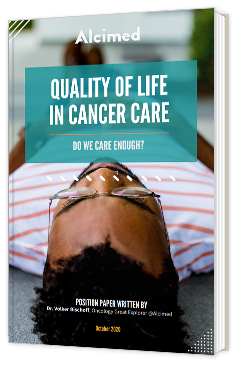

Qualité de vie des patients atteints de cancer – nous en soucions-nous suffisamment ?

"Cancer is a disease of increasing importance; case numbers have overtaken cardiac diseases as the number one cause of death in western countries and the same will happen globally in the next years. In our opinion cancer in the future will generally turn into a disease with much longer length of life. Many more patients will likely live with cancer for a long time and must learn to manage its disease effects, treatment side effects and other elements that strongly impact their Quality of Life (QoL). Even if the disease might turn somehow chronic and immediate threat to life is reduced, many patients need to undergo regular substantial monitoring which carries its own risks and negative implications, while also mentally carrying the disease with them. Consequently, many patients suffer not only from the disease itself but also from the impact it has on their life and more precisely their overall reduced quality of life. For all these reasons we believe that QoL implications will become much more important than already nowadays. For these reasons we decided to gather in this paper what is known and done around QoL in cancer care, and suggest areas of improvement with a focus on the industry side. (...)
The constitution of the World Health Organization (WHO) defines health as "A state of complete physical, mental, and social well-being not merely the absence of disease”[1]. The expression “wellbeing” already indicates a connection and stresses the importance of quality of life (QoL). QoL is defined as “an individual's perception of their position in life in the context of the culture and value systems in which they live and in relation to their goals, expectations, standards and concerns. It is a broad ranging concept affected in a complex way by the person's physical health, psychological state, personal beliefs, social relationships and their relationship to salient features of their environment”[2]"